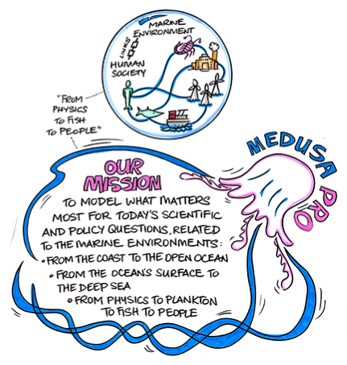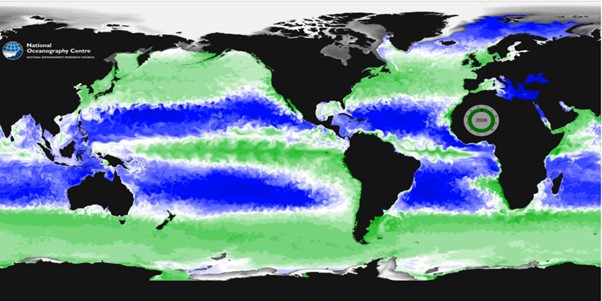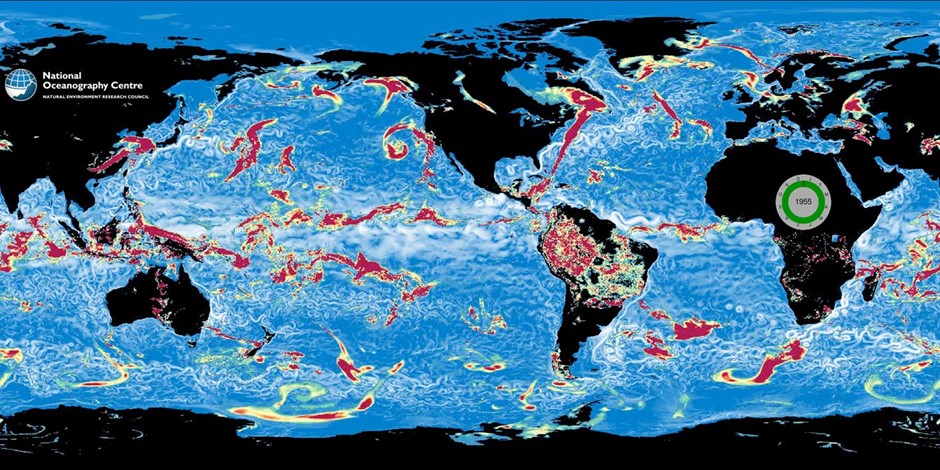AtlantiS is creating a comprehensive value-chain for climate, ocean and coastal modelling, from model development, configuration, validation and application to the delivery of actionable knowledge. Model development and application are directed towards key societal challenges, specifically: 
- the emerging and potential future impacts of climate change on marine systems and how they drive marine hazards and extreme weather,
- how we can improve the predictability of marine systems on seasonal to decadal scales,
- marine-focused solutions to issues of net-zero carbon, energy and food security and,
- how to effectively exploit the next generation of high-performance computers.
AtlantiS maintains a UK commitment to the NEMO consortium aligning with its recent strategy (2023-27). The work aligns closely with the UK initiatives with the Met Office and partner research centres including National Climate Science Partnership (UKNCSP), Joint Marine Modelling Programme (JMMP) and National Partnership for Ocean Prediction (NPOP). AtlantiS models are foundational to the Met Office prediction systems, including weather (global/UK scales), seasonal to decadal forecasting and international Coupled Model Intercomparison Projects (CMIP).
 Hydrodynamic Model development: This includes core NEMO activities of kernel development, community support, and future proofing for new High-Performance Computing (HPC) architectures (with Science and Technology Facilities Council). Research will target sea level and tidal processes, scale-aware eddy parameterisation, AGRIF (adaptive mesh) multiscale capability, vertical mixing and sea ice (with Centre for Polar Observation and Modelling).AtlantiS will explore Machine Learning (ML) emulators for sub-grid scale parameterisations.
Hydrodynamic Model development: This includes core NEMO activities of kernel development, community support, and future proofing for new High-Performance Computing (HPC) architectures (with Science and Technology Facilities Council). Research will target sea level and tidal processes, scale-aware eddy parameterisation, AGRIF (adaptive mesh) multiscale capability, vertical mixing and sea ice (with Centre for Polar Observation and Modelling).AtlantiS will explore Machine Learning (ML) emulators for sub-grid scale parameterisations.
Ecosystems and Impact Modelling: MEDUSA-PRO is maintaining its core role as a global biogeochemical model, tightly coupled to edge-of-capability ocean physics and UK Earth System Model. AtlantiS will expand its capability as a climate impacts model, to better represent the global coastal ocean by including, e.g., rivers inputs, the benthic module, sediments and optics, but without increasing the state variable count. AtlantiS is further developing the European Regional Seas Ecosystem Model (ERSEM), with suspended particulate matter, plankton growth, mixotrophy, and enhancing benthic modules with microphytobenthos and meroplankton capability, shelf specific carbon pump processes, and proof-of-concept studies for Dynamic-Adaptive process descriptions for biodiversity. The capability of NEMO-MEDUSA-PRO and NEMO-ERSEM models to link to a suite of impact models and socio-economic data workflows in global and regional settings are also being developed, addressing Sustainable Development Goals and enabling the interaction of our highly resolved marine models with socio-economic metrics and indicators. AtlantiS will ensure our core systems are able to interact with Digital Twins and ML emulators.
 Production and Delivery: AtlantiS is developing a collective approach to recording, upgrading, assessing, deploying and optimising configurations in a new development framework. Target configurations include global (1o, ¼o and 1/12o; including with shelf-enabled physics), NW Europe shelf-sea models (1.5 and 7 km) and multiple regional configurations arising from other NC and research projects. MEDUSA-PRO and ERSEM configurations are being integrated, including lightweight testbeds. This contributes to JMMP, a highly effective resource partnership (NOC, Met Office, BAS, CPOM), which supports UK research, operational and climate NEMO ocean modelling, including CMIP and Met Office predictive systems.
Production and Delivery: AtlantiS is developing a collective approach to recording, upgrading, assessing, deploying and optimising configurations in a new development framework. Target configurations include global (1o, ¼o and 1/12o; including with shelf-enabled physics), NW Europe shelf-sea models (1.5 and 7 km) and multiple regional configurations arising from other NC and research projects. MEDUSA-PRO and ERSEM configurations are being integrated, including lightweight testbeds. This contributes to JMMP, a highly effective resource partnership (NOC, Met Office, BAS, CPOM), which supports UK research, operational and climate NEMO ocean modelling, including CMIP and Met Office predictive systems.
Nascent near-present day capability is being developed (a multi-decadal simulation kept up to date with ~1-3 month lag) to include the full suite of global configurations. Forced future climate simulations using shelf enabled NEMO-MEDUSA-PRO and -ERSEM will be created: a new ocean-atmosphere (O-A) coupled ensemble to investigate variability, predictability, and extremes on decadal scales; and a novel, shelf seas forcing and parameter ensemble relevant to coastal sea level and shelf-sea ecosystem health, including the attribution of extreme events (e.g. heatwaves) to climate change.
This model suite is being developed to routinely produce complementary information for each of the Sustained Observations to put these in a wider context, aid analysis, and assess their efficacy. The modelling activities include development of modelling approaches to design monitoring strategies, plan and optimise deployments of autonomous vehicles, and support their operation.
Accessible, well documented workflows, model configurations, data handling tools and data are being designed to enable widespread use. Webinars, workshops, conferences and training are being planned to support this ambition, and will be advertised on this website, as well as via existing networks and newsletters.